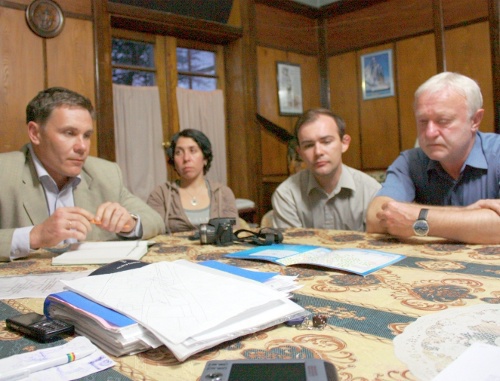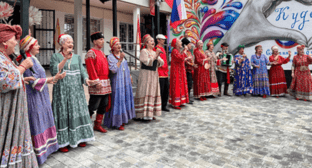
24 May 2011, 23:30
Sochi residents and ecologists tell European Parliament delegates about problems with Olympic construction
On May 18, in the course of the roundtable with delegates of the European Parliament, activists of environmental and social initiatives of the city of Sochi spoke about the problems associated with the construction of Olympic objects.
The deputy of the European Parliament Werner Schulz, who is heading the delegation, said that on the same day, during their trip over the construction sites of Olympic objects, representatives of the Russian State Duma and the Corporation "Olimpstroy" assured them that the construction of the sites is based on the principles of sustainable development; and everything possible is made to avoid the mistakes made during the construction of Olympic objects in the past.
"For me the dialogue with the public is very important, because so far we have met only the government officials," said Werner Schulz. "Where we were, the officials created an impression that  everything was very good, but I can't agree that this was all true, and, of course, I fully support public activists. It is sad that the International Olympic Committee (IOC) admits holding games not in the places, where all the necessary infrastructures is already in place."
everything was very good, but I can't agree that this was all true, and, of course, I fully support public activists. It is sad that the International Olympic Committee (IOC) admits holding games not in the places, where all the necessary infrastructures is already in place."
Mr Schultz told about his trip to Krasnaya Polyana: "My heart was bleeding, when I saw how the landscape was filled up with concrete, and the Open Joint-Stock Company (OJSC) 'Gazprom' is building its own objects additionally, while the Mzymta River looks like a sewer."
Dmitry Shevchenko, a member of the Board of the "Ecological Watch for Northern Caucasus", told the participants of the roundtable that throughout the last decade Russia saw negative trends of curtailing the democratic, political, economic and social freedoms.
According to his story, ecologists were initially against construction of the alpine skiing Olympic facilities in Sochi, because it can only be done at the expense of protected areas.
"We reported the position to the IOC; however, in 2007 Sochi was chosen to be the venue for the games. During these four years, the city suffered from catastrophic processes, associated with the environment and attitude towards local population: unique natural complexes were destroyed, the Mzymta River, which supplied drinking water to the population, was practically liquidated. The 'Gazprom' has intruded into the boundaries of the Caucasian Reserve, which is an element of the UNESCO heritage - and this is just one of numerous other examples," said Shevchenko.
At present, according to his story, the Russian national branches of the Greenpeace and the World Wildlife Fund have eliminated themselves from monitoring the construction of Olympic facilities; thus, there is practically no control by NGOs over preparing the Winter Olympic Games.
Suren Gazaryan, an ecologist and biologist, explained the reason for withdrawal of the above national branches by the fact that in 2008 a coordinating council was set up under the State Corporation "Olimpstroy", where public activists gave their advice, but during a year of the council's functioning none of the proposals was taken into account.
"In the end, I and ecologist Andrei Rudomakha were detained, when we interfered with the tree felling at the construction of the combined road by the OJSC 'RZhD' (Russian Railways)," Mr Gazaryan continued. "After that, representatives of the World Wildlife Fund and Greenpeace said that they would quit the council, if ecologists were not provided with a chance to monitor violations at Olympic sites. Since it was not done, the two organizations fulfilled their promise."
According to Mr Gazaryan, in 2010 representatives of the World Wildlife Fund and Greenpeace quitted the negotiations with the Organizing Committee of Sochi-2014, which is formally an NGO by itself, and launched a cooperation project with the UN Environment Programme UNEP.
"In early 2010, Russian ecologists presented the UNEP experts with a comprehensive list of recommendations; however, a year expired; and nothing of the list of recommendations was fulfilled. The Ecological Watch for Northern Caucasus has no choice, since we live and work here; and we still have to do all this," said Gazaryan.
Besides, he noted that residents of all the settlements in the construction zone - from Estosadok to Imereti Lowland - were forced to change their lifestyle. "By the way, nobody had ever asked them whether they want it. They are offered nothing instead - no jobs, no decent houses. All this is telling on resource management and results in destruction of the entire system, because the Olympic construction management ignores human and natural factors," said the ecologist.
Mr Gazaryan has added that the mountain cluster is now watching the processes of erosion and landslides, while rivers are constantly polluted. "Valleys and meadows will soon become an urbanized landscape. Alpine skiing resorts have cut off migration routes of wild animals. In 2008, Vladimir Putin promised us a set of compensations, but so far almost none of this has been done," he concluded.
Since the city of Sochi is a resort, under the Federal Law "On Specially Protected Natural Areas" its all territory is forbidden for placement of facilities such as solid domestic waste storages; however, such landfill is built in the village of Vardane, Lazarevskoe District of the city of Sochi, as ecologists point out.
Svetlana Danelyan, a local resident, reported that according to the IOC standards, the city claiming to host the Olympics should implement a "Zero Wastes" programme.  It was assumed that Sochi would introduce a separate collection of wastes and recycling; however, despite it, in 2010 in the village of Verkhneye Buu they started researches for building a landfill was started.
It was assumed that Sochi would introduce a separate collection of wastes and recycling; however, despite it, in 2010 in the village of Verkhneye Buu they started researches for building a landfill was started.
"The landfill for solid wastes (Olympic Object No. 167) should have been built between two rivers, Buu and Khobza," said Svetlana Danelyan at the roundtable. "The investor then calculated that it would be cheaper to build the landfill some 150 meters off the houses, where there are springs of drinking water. Therefore, last year on September 3 we went out to stop the machinery: a helicopter arrived, and OMON fighters with dogs arrived. As a result, about fifty local residents were brought to administrative justice by the court. Then we went to the court; and at present all the stages have been lost; thus, the Supreme Court of Russia is the last resort."
Natalia Kalinovskaya, an activist of the territorial public self-government, said that most valuable territories of the Imereti Lowland were first withdrawn from protected territories and then backfilled.
She also reported on the chaotic alienation of land plots. "In 2007 we were told that none of the houses would be demolished. As a result, several villages have been built for more than one thousand families (Nekrasovka, Tavricheskiy, Veseloye-Psou). We went out for a rally against demolition, as we believe that Olympic Games are not for resettling the seaside residents," said Kalinovskaya.
At the end of the meeting, Werner Schulz pointed out that he and his colleagues were working on the report, which will play a big role in Russia's relations with the European Union in modernization and cooperation issues. He offered Sochi public activists to prepare proposals for this report.
Author: Semen Simonov Source: CK correspondent




